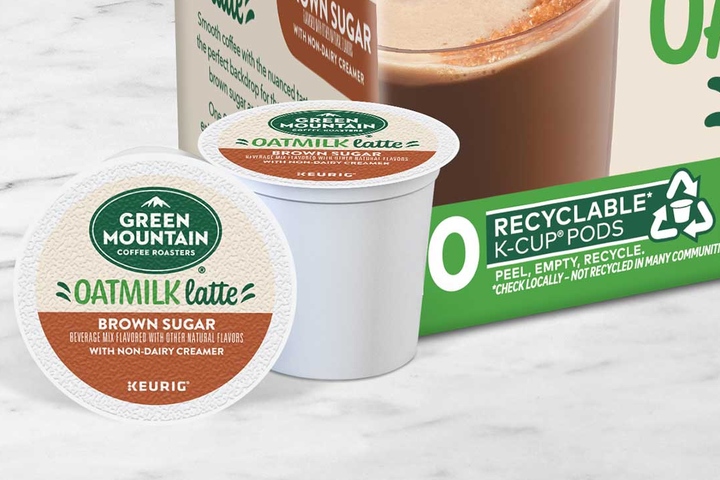KEURIG
SEC fines coffee systems manufacturer for ‘inaccurate' recyclability claims / Two recyclers decline to accept used PP-based pods
By Dede Williams
US stock market watchdog Securities and Exchange Commission (SEC, Washington, DC; www.sec.gov) has fined Keurig Dr Pepper (Burlington, Massachussetts, USA; www.keurigdrpepper.com) USD 1.5mn (EUR 900,000), claiming that the market-dominating coffee systems manufacturer made “inaccurate statements” about the recyclability of the plastic K-Cup-branded capsules it markets as pods.
US stock market watchdog Securities and Exchange Commission (SEC, Washington, DC; www.sec.gov) has fined Keurig Dr Pepper (Burlington, Massachussetts, USA; www.keurigdrpepper.com) USD 1.5mn (EUR 900,000), claiming that the market-dominating coffee systems manufacturer made “inaccurate statements” about the recyclability of the plastic K-Cup-branded capsules it markets as pods.
 Keurig’s recyclable coffee pods are reportedly being rejected by some recyclers (Image: Keurig) |
Specifically, the SEC took issue with claims in Keurig’s 2019 and 2020 annual reports that it had tested recyclability, with recycling facilities validating that the single-use pods “can be effectively recycled”.
In the commission’s view, the claims were not valid because two of the biggest US recyclers using curbside collection had raised “significant concerns” about the commercial feasibility of recycling the the pods and indicated that they did not intend to accept them.
Small format offers insufficient recycling benefit
One of the recyclers, it noted, saw “insufficient benefit” to make the financial case for including such small format or hard-to-recycle materials in curbside recycling schemes.
For the SEC, another argument against Keurig was that the company did not disclose the negative feedback to investors. With the omission, it said the producer, which has agreed to a cease-and-desist order under the Securities Exchange Act of 1934 without admitting fault, violated “key provisions of securities laws”.
Some market watchers noted that the fine was small for one of the world’s largest beverage companies that has a market capitalisation of more than USD 50 bn. Nevertheless, they said the action signalled a willingness by financial regulators to challenge recycling claims that could be inflating a company’s shareholder value.
With reference to the findings, the coffee giant told US media that its K-Cups are made from a recyclable polypropylene, “a polymer that is widely accepted at curbside recycling systems across North America”.
Commenting on the settlement, John Dugan, associate director of the SEC’s regional office in Boston, said public companies must ensure that the reports they file are complete and accurate so that investors can make educated investment decisions.
For the SEC, another argument against Keurig was that the company did not disclose the negative feedback to investors. With the omission, it said the producer, which has agreed to a cease-and-desist order under the Securities Exchange Act of 1934 without admitting fault, violated “key provisions of securities laws”.
Some market watchers noted that the fine was small for one of the world’s largest beverage companies that has a market capitalisation of more than USD 50 bn. Nevertheless, they said the action signalled a willingness by financial regulators to challenge recycling claims that could be inflating a company’s shareholder value.
With reference to the findings, the coffee giant told US media that its K-Cups are made from a recyclable polypropylene, “a polymer that is widely accepted at curbside recycling systems across North America”.
Commenting on the settlement, John Dugan, associate director of the SEC’s regional office in Boston, said public companies must ensure that the reports they file are complete and accurate so that investors can make educated investment decisions.
Dissenter says SEC ‘misreading’ company claim
In a dissenting opinion, commissioner Hester Peirce wrote on the SEC’s website that the authority was “misreading” Keurig’s statement “that the pods could be recycled as an implicit assertion that they would be recycled”.
The Massachusetts firm said it continues to encourage consumers to check with their local recycling programme to verify acceptance of the pods, as these are not recycled in many communities, adding that “we remain committed to a better, more standardised, US recycling system for all packaging materials.
While Keurig’s pods are made of plastic, most European coffee capsules – following market leader Nespresso’s example – are now made of aluminium, which is seen as easier to recycle.
The Massachusetts firm said it continues to encourage consumers to check with their local recycling programme to verify acceptance of the pods, as these are not recycled in many communities, adding that “we remain committed to a better, more standardised, US recycling system for all packaging materials.
While Keurig’s pods are made of plastic, most European coffee capsules – following market leader Nespresso’s example – are now made of aluminium, which is seen as easier to recycle.
18.09.2024 Plasteurope.com [256162-0]
Published on 18.09.2024
